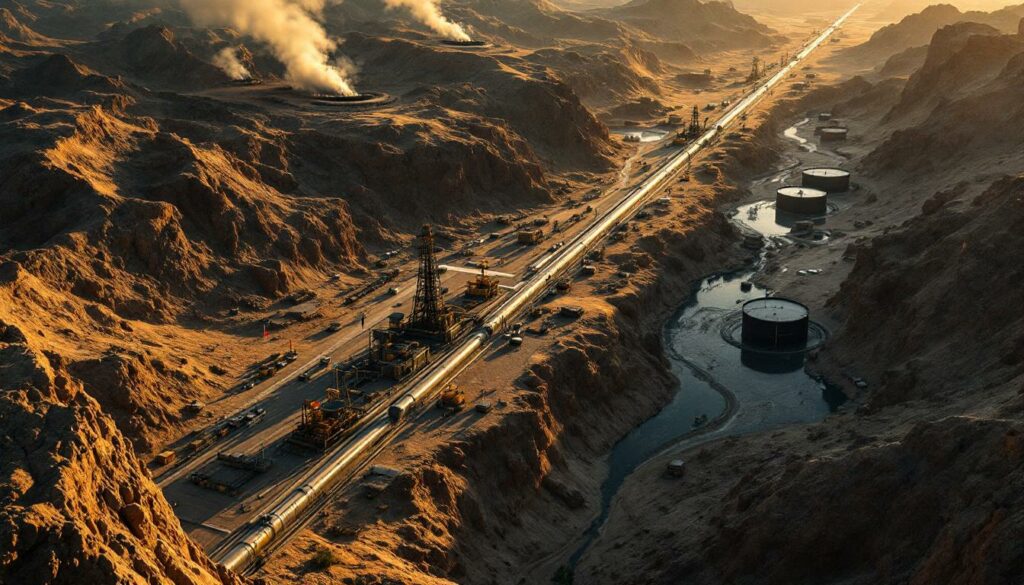Why Is a Restart of Kurdistan's Oil Export Not Imminent?
The autonomous region of Kurdistan in northern Iraq finds itself in a complex geopolitical stalemate that continues to block the resumption of its vital oil exports. Despite economic necessity and diplomatic efforts, several critical factors indicate that a restart of Kurdistan's oil export isn't imminent in the near term.
The March 2023 shutdown of the Iraq-Turkey pipeline has now stretched beyond two years, cutting off approximately 450,000 barrels per day (bpd) of Kurdish crude from global markets. This extended interruption has created a perfect storm of legal, political, security, and technical obstacles that resist quick solutions.
"The dispute hinges on Baghdad's demand for full control of exports and revenue, which Erbil rejects to protect its autonomy." — International Crisis Group, 2023
What Caused the Initial Shutdown of Kurdistan's Oil Exports?
The current export impasse began in March 2023 when Turkey halted the flow of Kurdish crude through the Iraq-Turkey pipeline following an international arbitration ruling by the International Chamber of Commerce (ICC). This landmark decision required Turkey to pay Iraq $1.5 billion in compensation for unauthorized Kurdish oil exports conducted between 2014 and 2018.
The ruling reinforced Baghdad's position that all Iraqi oil exports—including those from the Kurdistan region—must operate under federal authority. Turkey, seeking to improve relations with Iraq's central government, complied with the ruling by closing the pipeline valve, effectively strangling Kurdistan's independent oil export capability overnight.
Why Are Recent Drone Attacks Complicating the Situation?
In a significant escalation that further destabilizes prospects for export resumption, Kurdistan's oil infrastructure has become the target of sophisticated drone strikes throughout 2024 and 2025. These attacks have systematically targeted critical production facilities, including:
- The Khurmala oilfield, forced to halt operations after a June 2025 drone strike
- The Avana Dome field, which suspended production following a May 2025 attack
- Multiple pipeline junctions and pumping stations facing repeated sabotage attempts
- Storage facilities sustaining structural damage requiring extensive repairs
These coordinated attacks have disabled up to 200,000 bpd of production capacity, creating a secondary crisis even as the export impasse continues. Security experts attribute many of these strikes to Iran-backed militias exploiting the political vacuum.
"Drone attacks on Kurdish oil infrastructure represent a tactical escalation, making near-term resumption untenable," noted a recent Iraq Oil Report analysis. These security breaches have forced companies to divert resources toward facility protection rather than production maintenance or export preparations.
The Geopolitical Complexities Blocking Kurdistan's Oil Exports
The restart of Kurdistan's oil export isn't imminent as it is entangled in a web of competing regional interests, constitutional disagreements, and historical grievances that transcend simple economic considerations.
The Triangular Power Struggle
At the heart of the export blockage lies a three-way power struggle between Baghdad, Erbil (Kurdistan's capital), and Ankara (Turkey). Each party maintains positions that have proven difficult to reconcile:
- Baghdad insists on federal control over all Iraqi oil resources and revenue
- Erbil defends its constitutional right to manage its own natural resources
- Turkey balances its economic interests with legal obligations and regional relationships
"Turkey is caught between Baghdad's legal demands, Kurdish autonomy, and its own energy security needs," explains Blaise Misztal of the Atlantic Council. This precarious balancing act has paralyzed diplomatic progress.
The Iranian Shadow
Complicating matters further is Iran's strategic interest in limiting Kurdistan's economic independence. Tehran exerts influence through aligned Iraqi political factions and militia groups that have reportedly orchestrated infrastructure attacks.
"Iran-backed militias exploit the vacuum to destabilize Kurdistan, undermining export diplomacy," according to the Center for Strategic Studies. This dimension adds a layer of proxy conflict that further dims prospects for a quick resolution.
The Constitutional Dispute
The legal foundation of Kurdistan's oil exports remains contested. Baghdad cites Article 111 of the Iraqi constitution, which states that "oil and gas are owned by all the people of Iraq in all the regions and governorates." Kurdistan, however, points to Article 115, which gives regional powers precedence in matters not exclusively assigned to federal authorities.
This constitutional ambiguity has created parallel legal frameworks that remain unreconciled despite years of negotiation attempts.
Key Stakeholders and Their Positions
Baghdad's Central Government Position
Iraq's federal government maintains a firm stance that all oil exports from the country, including those from Kurdistan, must flow under its authority. This position is rooted in both legal interpretation and political necessity.
Key elements of Baghdad's position include:
- Insistence that all export revenue must flow through federal channels before distribution
- Rejection of Kurdistan's independent production-sharing contracts with international companies
- Demand for compliance with the ICC arbitration ruling
- Requirement for federal oversight of all Kurdistan oil operations
"Federal control over all exports is non-negotiable to prevent secessionist precedent," Iraqi Oil Minister Ihsan Abdul-Jabbar stated in April 2025, reflecting Baghdad's concern that Kurdish oil independence could encourage further fragmentation of Iraq.
Kurdistan Regional Government's Perspective
The Kurdistan Regional Government (KRG) faces severe economic pressure from the export shutdown but remains committed to preserving its resource autonomy. The KRG has accumulated debts exceeding $1.3 billion to international oil companies and delayed government salary payments by up to five months.
The KRG's position centers around:
- Constitutional right to manage its natural resources independently
- Necessity of direct payment channels to international oil companies
- Protection of existing production-sharing contracts
- Equitable revenue sharing with Baghdad while maintaining autonomy
"Autonomy over resources is constitutional; direct payments to IOCs are essential," KRG Prime Minister Masrour Barzani emphasized in a May 2025 interview, highlighting the existential nature of this issue for Kurdistan's economy.
Turkey's Diplomatic Balancing Act
Turkey's position has evolved from facilitating Kurdistan's independent exports to a more cautious approach following the ICC ruling. Turkey must now navigate complex regional relationships while protecting its economic interests.
Turkey's considerations include:
- Compliance with the $1.5 billion ICC arbitration ruling
- Maintaining strategic relationships with both Baghdad and Erbil
- Securing its energy transit role and associated fees
- Addressing its own security concerns regarding Kurdish militancy
This multifaceted balancing act has made Turkey reluctant to reopen the pipeline without a comprehensive agreement between all parties—an agreement that has proven elusive.
Economic Impact of the Prolonged Export Halt
Financial Strain on Kurdistan's Economy
The prolonged export stoppage has created severe economic challenges for Kurdistan, transforming what was once a prosperous region into an area facing fiscal collapse. The World Bank's "Iraq Economic Monitor" from March 2025 identified a staggering $2.8 billion deficit in the KRG's 2024 budget.
The economic consequences include:
- Lost revenue exceeding $5 billion since March 2023
- Public sector salary delays of up to five months
- Dramatic reduction in infrastructure investment
- Rising unemployment, particularly in oil-dependent areas
- Increasing public debt and declining foreign reserves
"Unpaid salaries fuel social unrest, with protests erupting in Sulaymaniyah," reported the International Crisis Group in June 2025, highlighting the social destabilization resulting from the economic crisis.
Effects on International Oil Companies
International energy companies with operations in Kurdistan face mounting difficulties that threaten their continued presence in the region. Many are considering asset divestment as US production decline and financial pressures mount.
IOCs face multiple challenges:
- Accumulated unpaid receivables reaching $1.7 billion according to DNO ASA's Q2 2025 financial statement
- Sharply reduced capital expenditure on field maintenance and development
- Legal uncertainties regarding contract validity
- Security concerns following targeted infrastructure attacks
"The shutdown risks permanent IOC exodus, crippling Kurdistan's long-term production," warns Wood Mackenzie's "Iraq Oil Outlook" from April 2025. This exodus has already begun, with Gulf Keystone Petroleum actively seeking to divest its Kurdistan assets due to $156 million in uncollected payments, according to Financial Times reporting in July 2025.
The diminishing presence of international expertise and investment threatens to create long-term production capacity issues that will persist even if exports eventually resume.
Technical and Infrastructure Challenges
Pipeline and Facility Readiness Issues
Even if political agreements were reached tomorrow, technical challenges would prevent immediate export resumption after 28 months of pipeline dormancy (March 2023–July 2025). According to the International Energy Agency's "Turkey's Oil Infrastructure" report (2024), approximately 40% of storage tanks at the Ceyhan terminal require refurbishment due to corrosion and disuse.
Key technical challenges include:
- Pipeline integrity verification requirements after prolonged shutdown
- Sensor and monitoring system recalibration
- Valve and pump station maintenance needs
- Terminal facility rehabilitation at Ceyhan
"Cold restarting a pipeline requires weeks of pressure tests and leak monitoring," notes the Society of Petroleum Engineers' "Pipeline Safety Protocols" (2024). This technical reality adds a minimum 8-12 week timeline between any political agreement and actual flow resumption.
Security Infrastructure Requirements
The recent wave of drone attacks has exposed vulnerabilities in Kurdistan's oil infrastructure that require significant security upgrades before operations can safely resume.
Necessary security enhancements include:
- Deployment of anti-drone systems around critical facilities
- Enhanced perimeter security and surveillance networks
- Hardened infrastructure for vulnerable components
- Intelligence cooperation to identify threats before attacks
These security upgrades represent not just a financial investment but also a time-intensive implementation process that further extends the timeline for any potential export restart.
Logistical Coordination Requirements
Restarting exports would require complex coordination among multiple parties across two countries:
- Pipeline operators in both Iraq and Turkey
- Terminal facilities at the Mediterranean port of Ceyhan
- International shipping and trading companies
- Monitoring and verification systems for revenue transparency
The previous restart of the Kirkuk-Ceyhan Pipeline in 2018 required 11 weeks of preparation after just one year of shutdown, according to Platts reporting. The current 28-month interruption presents significantly greater logistical challenges.
What Would a Potential Resolution Look Like?
Necessary Components for a Sustainable Agreement
Given the complex web of issues, any viable solution to restart Kurdistan's oil exports would require a comprehensive agreement addressing legal, financial, and security concerns of all parties.
Essential components would include:
- A transparent revenue-sharing mechanism acceptable to both Baghdad and Erbil
- Legal framework recognizing or restructuring existing production contracts
- Security guarantees and protection mechanisms for oil infrastructure
- International monitoring of export volumes and payments
- Compliance pathway regarding the arbitration ruling's financial obligations
The most viable model would likely involve federal oversight of exports while preserving some KRG autonomy in production management and ensuring direct operating expense payments to IOCs.
Timeline Realities for Export Resumption
Even with political will, the combination of diplomatic, legal, technical, and security challenges creates a timeline measured in months rather than weeks:
Realistic timeline components:
- 3-6 months: Political negotiation and agreement finalization
- 2-3 months: Technical preparation and pipeline testing
- 1-2 months: Security upgrades implementation
- 1-2 months: Logistical coordination and market preparations
This creates a minimum 7-13 month window between serious negotiations and actual export flow—assuming no additional complications or security incidents.
The most optimistic scenario would involve phased implementation rather than immediate full-capacity restart, beginning with limited test flows before scaling to full capacity.
Global Oil Market Implications
Limited Immediate Market Impact
The continued absence of Kurdish oil exports has had a relatively contained effect on global markets, primarily because other producers have filled the gap during a period of adequate global supply.
Market adjustment factors include:
- Global supply increases from other sources, particularly U.S. shale and Brazilian production
- OPEC market influence providing market management tools
- Gradual adaptation of trading patterns to alternative crude sources
- Broader market forces (including economic growth concerns) dominating price movements
The global market has largely absorbed the loss of Kurdistan's 450,000 bpd, limiting price impacts specifically attributable to this outage. This market adaptation has ironically reduced pressure for a quick resolution, as the global consequences remain manageable.
Long-term Strategic Considerations
While immediate market impacts have been limited, the prolonged export halt raises important strategic questions about Iraq's role in global oil supply and regional energy security.
Strategic implications include:
- Diminished perception of Iraq as a reliable long-term supplier
- Deteriorating investment climate for international capital in Kurdistan
- Potential development of alternative export routes (though logistically challenging)
- Shifting balance of power within OPEC as Iraq's full potential remains constrained
These longer-term considerations will shape investment decisions and oil market trade dynamics even after the immediate crisis is resolved.
What Steps Are Currently Being Taken?
Ongoing Diplomatic Initiatives
Despite the challenges, diplomatic efforts continue on multiple fronts to find a resolution pathway:
- U.S.-mediated discussions between Baghdad and Erbil representatives
- European Union energy security engagement through diplomatic channels
- United Nations assistance in framework development
- Industry stakeholder participation in technical working groups
These diplomatic channels maintain communication even as substantive progress remains elusive. The U.S. State Department continues to designate a special envoy for Iraq-KRG negotiations, though concrete breakthroughs have not materialized.
Security Enhancement Measures
In response to escalating attacks, security measures are being implemented to protect remaining production capacity:
- Deployment of anti-drone systems at critical facilities
- Enhanced perimeter security and surveillance networks
- Intelligence cooperation to identify threats before attacks
- Risk assessment and contingency planning for vulnerable infrastructure
These security measures represent a necessary but insufficient step toward export resumption, addressing immediate threats while broader political issues remain unresolved.
Contingency Planning by Stakeholders
Both the KRG and international companies are developing contingency plans while awaiting a resolution:
- Diversification of KRG revenue sources (though limited options exist)
- Production maintenance at minimal levels to preserve reservoir integrity
- Legal preparations for potential contract disputes
- Alternative domestic utilization of produced oil where feasible
These measures represent adaptation to the prolonged crisis rather than steps toward resolution, reflecting the growing recognition that a restart of Kurdistan's oil export isn't imminent.
FAQ: Kurdistan Oil Export Situation
When did Kurdistan's oil exports through Turkey stop?
Kurdistan's oil exports through the Iraq-Turkey pipeline were halted in March 2023 following an international arbitration ruling against Turkey requiring $1.5 billion in compensation to Iraq for unauthorized exports between 2014-2018.
How much oil production capacity is affected by the export stoppage?
Approximately 450,000 barrels per day of export capacity has been directly affected by the pipeline closure. Recent attacks have further disrupted up to 200,000 bpd of production capacity within Kurdistan.
Who controls the oil in Kurdistan legally?
This remains a core dispute. Baghdad cites Article 111 of the Iraqi constitution, which states that "oil and gas are owned by all the people of Iraq in all the regions and governorates." Kurdistan points to Article 115, which gives regional powers precedence in matters not exclusively assigned to federal authorities.
What companies are most affected by the export halt?
International companies with significant Kurdistan operations include DNO, Genel Energy, Gulf Keystone Petroleum, HKN Energy, and ShaMaran Petroleum. These companies have faced payment delays exceeding $1.7 billion and operational challenges threatening their continued presence.
Could Kurdistan develop alternative export routes?
While theoretically possible, alternative export routes face significant political, economic, and logistical hurdles. Options including trucking to Turkey or a new pipeline through Syria or Iran all present security risks, high costs, and political complications that make them impractical solutions in the near term.
Outlook for Kurdistan's Oil Sector
Short-term Prospects (6-12 months)
The immediate outlook for Kurdistan's oil sector remains challenging, with limited prospects for export resumption within the next year:
- Continued export disruption virtually certain
- Further financial strain on the KRG budget and public services
- Possible additional production curtailments as maintenance issues accumulate
- Ongoing diplomatic efforts likely to yield limited tangible progress
- Potential for additional IOC divestments as financial pressures mount
Without a breakthrough, the economic situation will likely deteriorate further, potentially leading to greater social unrest and political instability within Kurdistan.
Medium-term Scenarios (1-3 years)
Several potential scenarios could emerge over a 1-3 year horizon:
Scenario 1: Gradual Negotiated Resolution
- Phased agreement between Baghdad and Erbil
- Limited export resumption under federal oversight
- Partial resolution of IOC payment issues
- Probability: Moderate
Scenario 2: Federal Takeover
- Baghdad assumes direct control of Kurdistan oil operations
- Renegotiation of international contracts under federal terms
- Centralized revenue management with allocated KRG portion
- Probability: Increasing if economic crisis deepens
Scenario 3: Status Quo Continuation
- Continued deadlock with minimal production for local use
- Further deterioration of infrastructure and investment
- Accelerated IOC exits from the region
- Probability: High
Want to Spot the Next Major Discovery Before the Market Does?
Don't miss potential investment opportunities in the mining sector—gain immediate insights on significant ASX mineral discoveries with Discovery Alert's proprietary Discovery IQ model. Explore our dedicated discoveries page to see how historic discoveries have generated substantial returns and begin your 30-day free trial today.




